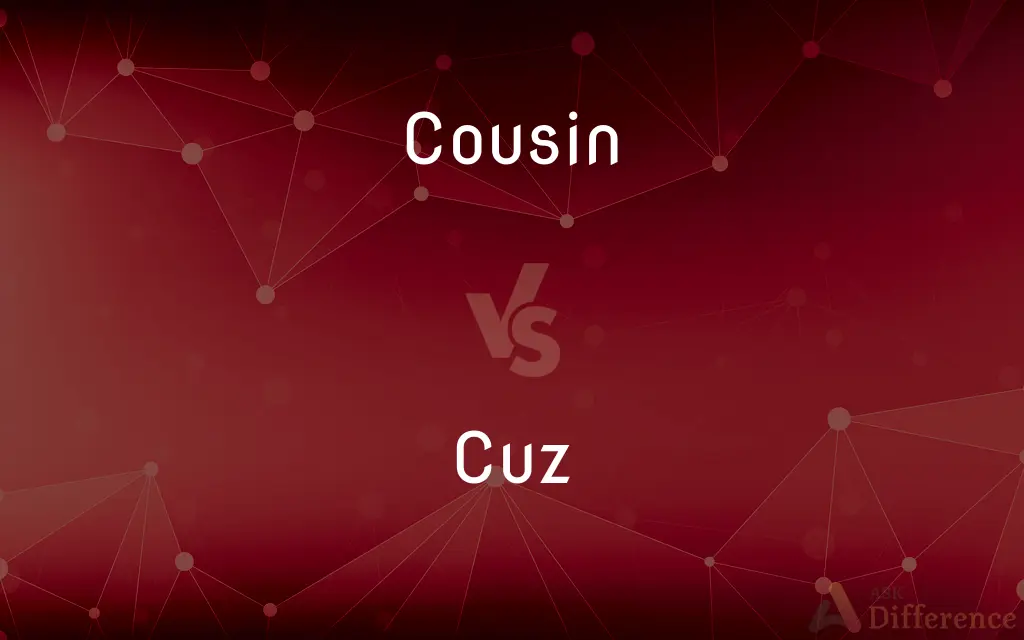Cousin vs. Cuz — What's the Difference?
Edited by Tayyaba Rehman — By Fiza Rafique — Updated on April 9, 2024
Cousin refers to a family member related by blood, while "cuz" is slang for cousin, often used informally.

Difference Between Cousin and Cuz
Table of Contents
ADVERTISEMENT
Key Differences
Cousin is a term used to describe a family member who is the child of one's aunt or uncle, signifying a specific blood relation within an extended family. These relationships are recognized in family gatherings and have legal acknowledgment in many cultures. On the other hand, "cuz" is an informal abbreviation of the word cousin. It's used colloquially in speech and text, particularly in informal contexts or among younger generations. This term strips away the formality associated with the full word, emphasizing a casual or friendly relationship rather than focusing on the precise nature of the familial connection.
While cousin relationships are often charted on family trees and recognized in legal documents, highlighting their importance in understanding family dynamics and inheritance, "cuz" rarely appears in formal writings or discussions. It's a term more likely found in text messages, social media, or casual conversation, reflecting its role in everyday, informal communication rather than in structured family analysis or legal matters.
Cousins, in many cultures, play significant roles during family events, rituals, and traditions, their presence and participation often imbued with cultural and familial expectations. In contrast, the use of "cuz" can signify a more relaxed, peer-like relationship, which may or may not be laden with the same expectations.
The recognition and importance of cousins can vary greatly across different cultures, with some placing a strong emphasis on maintaining close relationships and clear distinctions among various types of cousins (e.g., first, second, removed). Meanwhile, the use of "cuz" often transcends cultural specificities, offering a universal, informal way to refer to someone considered to be like a cousin, regardless of the exact nature of their relationship.
In legal contexts, the term cousin has clear definitions and implications, especially concerning inheritance laws, marriage regulations, and familial rights. However, "cuz," due to its informal nature, holds no legal standing or recognition, illustrating how language and terminology can significantly impact the interpretation and understanding of family relationships.
ADVERTISEMENT
Comparison Chart
Formality
Formal, used in legal and official contexts.
Informal, used in casual conversation.
Meaning
A relative descended from a common ancestor.
Slang for cousin, indicating familiarity.
Usage Context
Family gatherings, legal documents, genealogy.
Text messages, social media, informal talk.
Cultural Significance
Often involved in rituals, traditions.
Used more flexibly, without cultural connotations.
Legal Recognition
Recognized in laws regarding marriage, inheritance.
No legal recognition.
Compare with Definitions
Cousin
A child of one's uncle or aunt.
My cousin Sarah will be visiting us this weekend.
Cuz
Informal term for a cousin, indicating a close or familial relationship.
Going to the game with my cuz this weekend.
Cousin
A term of address for a close family friend in cultures where familial terms are broadly applied.
I call him cousin, though we're not related by blood.
Cuz
Used among friends or peers similarly close as family but not related by blood.
She's not my sister, she's my cuz from way back.
Cousin
In some contexts, used to describe any familial relationship beyond immediate family.
We treat all our distant cousins like close family.
Cuz
Colloquial way of referring to a relative for brevity in communication.
Told my cuz about the party, and he's in.
Cousin
A relative descended from a common ancestor, not necessarily immediate family.
I discovered a cousin in Australia through genealogy research.
Cuz
Slang used to address someone in a friendly or familiar manner, irrespective of actual family ties.
What's up, cuz? Haven't seen you in ages.
Cousin
A person related to another with common ancestors or family backgrounds.
At the family reunion, I met dozens of cousins I hadn't known before.
Cuz
A term expressing kinship or affiliation in certain social groups or communities.
In our club, everyone's a cuz to each other.
Cousin
Commonly, "cousin" refers to a "first cousin", a relative whose most recent common ancestor with the subject is a grandparent. More generally, in the lineal kinship system used in the English-speaking world, a cousin is a type of familial relationship in which two relatives are two or more familial generations away from their most recent common ancestor.
Cuz
(informal) because
Cousin
A child of one's aunt or uncle. Also called first cousin.
Cuz
(informal) because
Cousin
A relative descended from a common ancestor, such as a grandparent, by two or more steps in a diverging line.
Cuz
(informal) cousin (usually as a term of address, but not necessarily towards one's cousin)
Cousin
A member of a kindred group or country
Our Canadian cousins.
Cousin
Something similar in quality or character
"There's no mistaking soca for its distant Jamaican cousin, reggae" (Michael Saunders).
Cousin
Used as a form of address by a sovereign in addressing another sovereign or a high-ranking member of the nobility.
Cousin
The child of a person's uncle or aunt; a first cousin.
I think my cousin is a good man.
Cousin
(archaic) A kinsman.
Cousin
Any relation who is not a direct ancestor or descendant but part of one's extended family; one more distantly related than an uncle, aunt, granduncle, grandaunt, nephew, niece, grandnephew, grandniece, etc.
Cousin
(obsolete) A title formerly given by a king to a nobleman, particularly to those of the council. In English writs, etc., issued by the crown, it signifies any earl.
Cousin
(figurative) Something kindred or related to something else.
Cousin
A member of the British intelligence services (from an American perspective) or of the American intelligence services (from a British perspective).
Cousin
One collaterally related more remotely than a brother or sister; especially, the son or daughter of an uncle or aunt.
Thou art, great lord, my father's sister's son,A cousin-german to great Priam's seed.
Cousin
A title formerly given by a king to a nobleman, particularly to those of the council. In English writs, etc., issued by the crown, it signifies any earl.
My noble lords and cousins, all, good morrow.
Cousin
Allied; akin.
Cousin
The child of your aunt or uncle
Common Curiosities
What does "cuz" mean?
"Cuz" is slang for cousin, used informally to refer to a cousin or a close friend.
How are cousins classified?
Cousins are classified based on their generational distance from one, such as first, second, or third cousins.
Is it common to call friends "cuz"?
Yes, in informal speech, friends are sometimes referred to as "cuz" to indicate closeness.
Can "cuz" be used in formal writing?
No, "cuz" is informal and not appropriate for formal contexts.
Are all cousins considered immediate family?
No, cousins are considered extended family, not immediate family.
Is there a difference in closeness between using "cousin" and "cuz"?
"Cuz" might imply a closer or more informal relationship than "cousin."
Do cousins have legal significance?
Yes, cousins can have legal significance in matters like inheritance and marriage laws.
How do legal systems define cousins?
Legal definitions usually consider cousins as extended family without the direct inheritance rights of immediate family.
Can the term "cousin" be used metaphorically?
Yes, it can be used to describe any person or thing thought to be related or similar in some way.
How do different cultures view cousin relationships?
Cultural views on cousins vary, with some cultures emphasizing close relationships and others less so.
Can cousins be considered close family?
Yes, many people consider cousins to be close family, especially if they share strong bonds.
Why might someone use "cuz" instead of cousin?
For brevity, informality, or to express a casual, friendly relationship.
Is the use of "cuz" accepted in all social circles?
Acceptance varies; it's more common in informal settings and among younger demographics.
Share Your Discovery

Previous Comparison
Tiny vs. Small
Next Comparison
Projection vs. TransferenceAuthor Spotlight
Written by
Fiza RafiqueFiza Rafique is a skilled content writer at AskDifference.com, where she meticulously refines and enhances written pieces. Drawing from her vast editorial expertise, Fiza ensures clarity, accuracy, and precision in every article. Passionate about language, she continually seeks to elevate the quality of content for readers worldwide.
Edited by
Tayyaba RehmanTayyaba Rehman is a distinguished writer, currently serving as a primary contributor to askdifference.com. As a researcher in semantics and etymology, Tayyaba's passion for the complexity of languages and their distinctions has found a perfect home on the platform. Tayyaba delves into the intricacies of language, distinguishing between commonly confused words and phrases, thereby providing clarity for readers worldwide.
















































